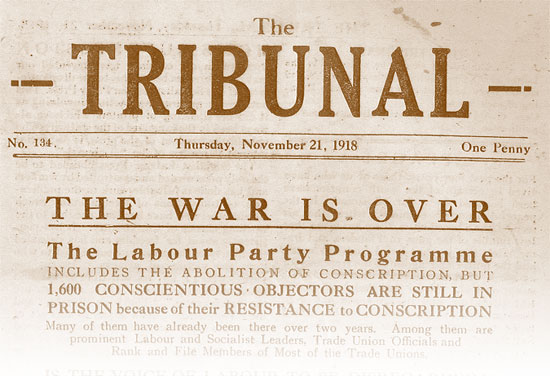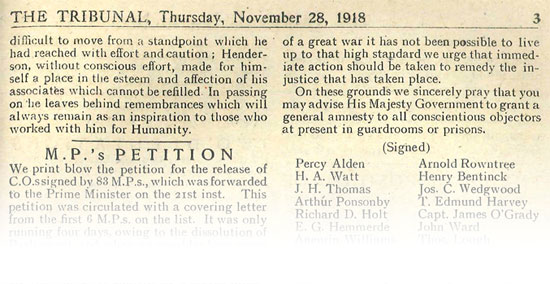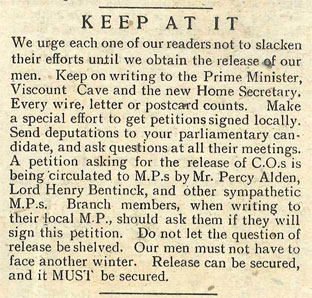
| HOME | TRIBUNAL HOME |
November 1918
By modern-day reckoning, November 1918 saw the end of four long years of war - the armistice coming with war-justifing, almost poetic inevitability at 11am, 11th of the 11th. But for both soldiers at the front, and the CO movement at home, the events of November were anything but clear-cut. The armistice did not mean the prospect of immediate peace, an end to conscription and the release of conscientious objectors from prison - and the tone of the Tribunal this month is a simple question that was on the minds of everyone at the time:
What happens now?
Deaths in November:
The Tribunal continued to sorrowfully report on each CO death as news came through. In November, they published the obituaries of 7 Conscientious Objectors, largely victims of the influenza epidemic.
Hal Beynon
Glyn Evans
Henry Haston
Andrew Henderson
Sidney Linscott
Joseph Mountfield
Alexander Peddieson
14th November: What Happened to the War?
To modern eyes, the 14th November issue of the Tribunal seems very strange. There’s no mention of the armistice - even though there’s a “Stop-Press News” section detailing the ongoing prosecution of Joan Beauchamp as publisher of the Tribunal. The issue as a whole is concerned with the general election, and the only clue that the war has ended is the first line of the “Demobilisation” article;
“With the end of the war comes demobilisation...”
The printing and distribution of the Tribunal accounts for this strange absence - printing in the week before release date, especially since the autumn raids on the printing press used by the NCF, was a slow and drawn out procedure. Small hand presses could not keep up with the demand, and printing began earlier and earlier - with covert and very risky distribution also slowing down the rate at which the Tribunal could be issued. Though published three days after the Armistice, articles like the “Stop-Press News” suggest that the issue was written far earlier - around the 8th or 9th of November.
Nevertheless, the 14th November issue points towards what the NCF would be focused on a week later, in the new post-armistice world. Prescient warnings of the dangers of a “victors peace”, the beginnings of a concerted campaign for the immediate post-war release of Absolutist Objectors in prison, and even an early demobilisation for the Non-Combatant Corps all feature - and will all be revisited in the months ahead.
21st November: THE WAR IS OVER
The belated armistice-related front page of the Tribunal came on the 21st of November and shows with crystal clarity the new focus of the No-Conscription Fellowship. With wartime rules relaxed (or soon to be), the NCF looked forward to becoming a truly established political force. The clear and baldly stated propaganda cover shows their political colours. The NCF threw it’s full weight behind the Labour party, slowly emerging in the post war period after the mid-war collapse of the Liberal majority, as a credible governing party. Labour represented the social justice that the majority of the NCF based their objection on, but crucially had made the abolition of conscription, and rapid demobilisation the cornerstones of their appeal to soldiers - and conscientious objectors.
The NCF reconfigured itself once again, dropping - temporarily - the call for an end to all wars to focus on securing the release of COs from both prison and army. Release and an end to conscription was the overwhelming focus of 1919, and a clearly stated support for the only political party calling for it was a major part of their platform.
Labour and the NCF had more than one thing in common. Both had a huge base of support in the CO movement, had some of their best and brightest locked away for opposing the war, and now - belated as it was - the Labour party as a whole was taking an anti-conscription platform. As the post-war period turned into the 20’s and 30’s the remnants of the NCF and the Labour party would march ever closer together.
In the end, the Liberal-Conservative coalition would win a massive majority, but it was the last time. Conscientious Objectors campaigned in the election, stood for the Labour party around the country - and the experience they gained would put many of them in Parliament four years later.
21st November: KEEP AT IT!
The general election, though hopefully resulting in the release of COs in prison, was not a sure thing and (wisely, as it turned out), the NCF did not pin all their hopes for the end of prison sentences on it. November 1918 would not mark any particular change in the situation of Conscientious Objectors, and though Tribunals were soon to wind down, the army was still happily sending COs to courts martial and then on to prison well into 1919. The NCF reminded its readership that though the war seemed over, there was still work to be done:
“We urge each one of our readers not to slacken their efforts until we obtain the release of our men. Keep on writing to the Prime Minister, Viscount Cave and the Home Secretary. Every wire, letter of postcard counts. Make a special effort to get your petitions signed locally. Send deputations to your parliamentary candidate, and ask questions at all their meetings.”
Constant political pressure was the aim of the game.
“Do not let the question of release be shelved. Our men must not have to face another winter. Release can be secured, and it MUST be secured.”
Sadly for the COs in prison, another winter was almost assured - and with it would come another, sadly inevitable, round of deaths.
28th November - M.P’s Petition
Part of the exhortation to “KEEP AT IT!” featured above was encouraging MPs around the country to sign a petition calling for the immediate release of Conscientious Objectors. Signed by 83 M.Ps, the petition as featured in the November 28th issue, is about as far from the NCFs typical tone and approach to politics as it is possible to be, and still be on the same side of the argument. The careful language speaks of a committee publication, and one that has been carefully vetted by different interests to ensure that it stays on-message without being too controversial. Not every MP who signed the petition was a consistent CO supporter or even opponent of Conscription. Some had been disgusted by the approach the government took to COs, or simply believed in fair and equitable legal treatment.
Consequently, the petition is loaded with phrases that the NCF no doubt winced to print. The imprisonment of COs was unjust “however mistaken some of us believe them to be”. Releasing COs in this “moment of national rejoicing” would have been a “supreme act of chivalry”. COs had only been imprisoned in the first place because of the “stress of a great war” that made it “impossible to live up to that high standard”.
The petition was all very conciliatory, and painted the treatment of COs as a regrettable necessity. Now that the war was over, the benevolent and paternalistic government could stretch out it’s hand in a gesture of kindness and release its wayward sons from prison.
However the staff of the NCF and Tribunal viewed the tone of the petition, it must have been seen as a step - a small step, but a step nonetheless - in the right direction. December would see if it brought Absolutists any nearer to release.
Clink on images to enlarge


